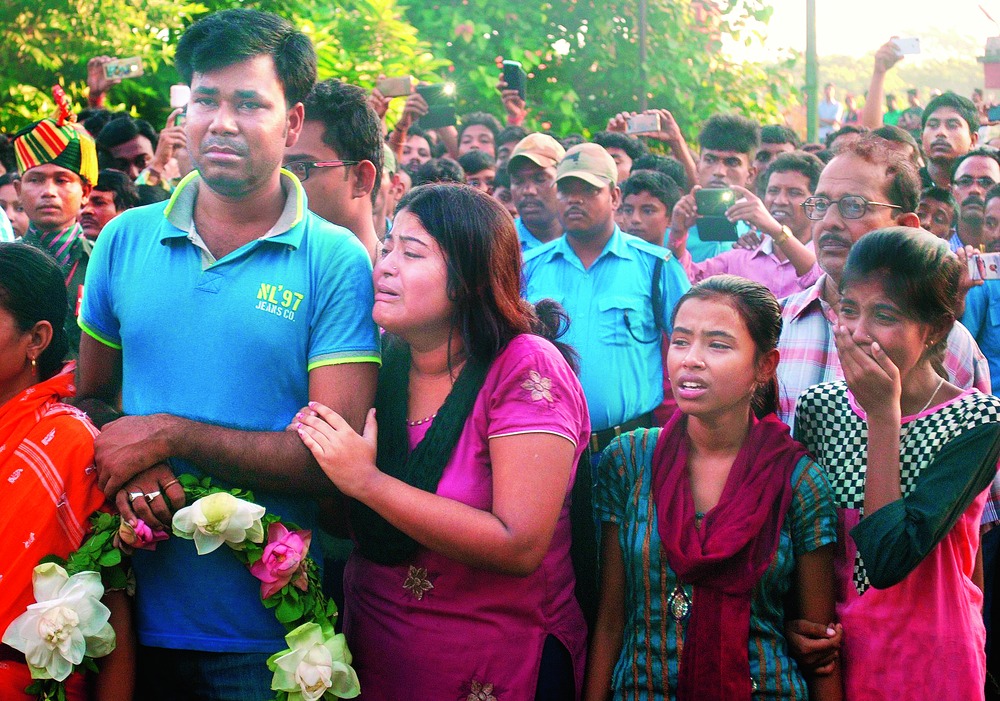
New Delhi, Sept. 20: The foreign office is exploring the possibility of escalating diplomatic pressure on Pakistan beyond rhetoric and lobbying, but has cautioned against a military strike in response to the Uri terror attack without first building a broad international consensus.
The options available to the foreign ministry include the threat of reviewing the Indus Water Treaty under which 80 per cent of the water that flows into the river's basin belongs to Pakistan, and withdrawing trade concessions New Delhi gives to Islamabad.
Simultaneously, India today began a thrust to isolate Pakistan within the South Asian Association for Regional Corporation (Saarc), the grouping whose summit Islamabad is to host in November.
India can also further step up overt support to Pakistani dissidents in exile - especially from Balochistan and Pakistan-occupied-Kashmir - in keeping with threats to do so that Prime Minister Narendra Modi has already unveiled.
But even a military response could backfire without a global consensus over the need for such a strike that remains elusive, the foreign office has indicated to the country's political leadership, two senior officials have independently confirmed.
These concerns, the officials said, have been communicated to both national security adviser Ajit Doval and to home minister Rajnath Singh on a day foreign secretary S. Jaishankar cut short a trip to Vienna to return for discussions over India's response to the Uri attack. Four terrorists that India insists came from Pakistan killed 18 soldiers on Sunday at an army camp in Uri.
The foreign ministry's cautionary signals come amid growing evidence that while the world's major nations have condemned the Uri attack and are willing to criticise Pakistan, their principal worry remains any further escalation of tensions in nuclear-armed South Asia. US secretary of state John Kerry, in a meeting with Pakistan Prime Minister Nawaz Sharif in New York today, pointedly referred to what for India amount to America's competing interests.
"The Prime Minister (Sharif) and Secretary Kerry expressed strong concern with recent violence in Kashmir - particularly the army base attack - and the need for all sides to reduce tensions," US State Department spokesperson John Kirby said in a statement on the meeting.
Kirby then went on to outline US concerns over the tensions following the Uri attack escalating into a nuclear conflict, especially given Pakistan's deployment of "tactical" nuclear weapons in advanced positions and in the hands of field commanders. "Secretary Kerry also stressed the need for restraint in nuclear weapons programs," Kirby said.
Diplomatically, any military action by Indian security forces in retaliation to what Pakistan will claim is the activity of a non-state actor may risk New Delhi finding itself in the rare position of being accused of asymmetric escalation of tensions.
That's a risk that diplomats argue may still be worth taking if, barring Pakistan and a few of its closest allies, much of the world chooses to not point fingers at India if a full-fledged conflict ensues.
The evidence so far, diplomats said, suggests that while India is gaining far more support than it has in the past, a military strike at this stage could help Islamabad shed some of the frustration with terrorism rising even among its traditional allies.
That frustration was evident in the messages of support India has received following the Uri attack from Saudi Arabia, the UAE, Bahrain and Qatar - all members of the Organisation of Islamic Cooperation that has traditionally backed Pakistan over the Kashmir dispute.
"The foreign ministry expressed the Kingdom of Saudi Arabia's strong condemnation and denunciation of the terrorist attack that targeted an Indian military base in the Uri area of north Kashmir, killing and wounding dozens," Saudi Arabia's foreign ministry said in a statement.
But the diplomatic gains India has made in recent years in distancing wealthy Arab nations from Pakistan could evaporate if New Delhi responds to the Uri attack militarily, officials warned.
Closer home, India is also trying to isolate Pakistan within the Saarc, in preparation for the grouping's summit in November. New Delhi is quietly mulling the possibility of using support from other nations unhappy with Islamabad - Bangladesh and Afghanistan - to demand that Pakistan demonstrate action against terrorist camps before the Saarc summit. Implicit in that demand is the threat of a boycott from the Saarc summit.
Today, Afghanistan President Ashraf Ghani and Sri Lankan President Maithripala Sirisena telephoned Modi to criticise the Uri attack.
Ghani, according to the Indian foreign office, referred to the strike as a "cross-border terrorist attack".
But India's reputation as a responsible military power that has never been accused internationally - barring by Pakistan - of triggering an armed conflict - could take a battering through a cross-border strike.
That reputation is at the centre of the broad support India enjoys as it aspired to take on a larger global role - including through membership of the nuclear suppliers group, which is expected to meet in a special plenary over New Delhi's application later this year.
Instead, officials said, India could raise the spectre of diplomatic hits at Pakistan while working on a broader consensus against Islamabad.
Waters from the Indus and its tributaries are critical for irrigation in most of Pakistan -- and the prospect of a review in its terms offers India leverage, officials argued.
India could also withdraw the most-favoured nation status it has granted to Pakistan -- though Islamabad has long insisted it gains little from the tag, since New Delhi imposes other restrictions on the movement of goods.
Pakistan's trade with the rest of South Asia contributes only 4 per cent to its total trade kitty, so any effective economic hit against Islamabad will also need support from other major powers, officials conceded.










